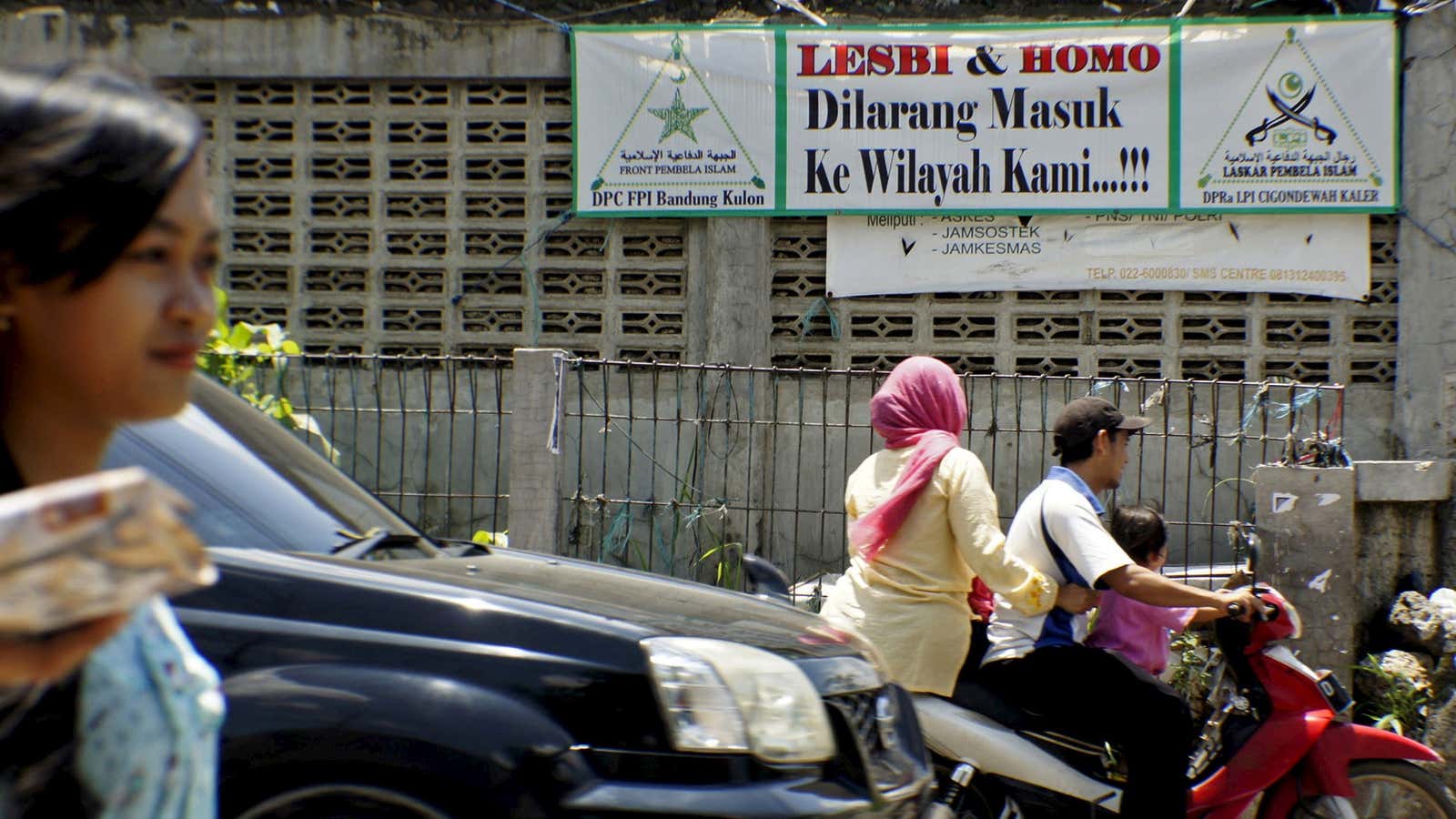Many Indonesians boast about their nation’s acceptance of all kinds of people. The national motto, Bhinneka tunggal ika, means “Unity in diversity.” But a look at a growing number of Twitter posts with the hashtag #TolakLGBT in recent days suggests that acceptance has limits. Tolak means “reject,” and LGBT of course stands for lesbian, gay, bisexual, and transgender. Some Indonesians, it would appear, are unabashedly, openly anti-LGBT.
This popular post is an Indonesian version of the “God created Adam and Eve, not Adam and Steve” refrain. (Hendra is common male name in Indonesia.)
And this sign on the left says “LGBT is a disease, not a human right.”
The recent online outbreak of anti-gay sentiment comes as vice president Jusuf Kalla asked the United Nations Development Program on Feb. 15 to not finance LGBT community programs in the country. The UN body had prepared funds worth $8 million to support LGBT campaigns in Southeast Asia, including Indonesia.
Unlike in nearby Malaysia, gay sex is not criminalized in Indonesia, with the exception of the Aceh province, which adopted Sharia law. Popular gay and transsexual entertainers often appear on TV programs, and, especially in urban areas, people largely accept the LGBT community.
But anti-LGBT sentiment has been prominent of late in Indonesia, and polls suggest underlying anti-LGBT sentiments are strong. In a 2013 Pew Research Center survey, 93% answered “No” to the question, “Should society accept homosexuality?” And in a survey Gallup conducted in 2014, few Indonesians (just 3%) said the area they live in is a good place for members of the LGBT community to live.
Last month the Islamic Defenders Front put up banners around Bandung, the nation’s third-largest city, calling for the gay community to stay away. Mayor Ridwan Kamil reprimanded the group and forced it to take the banners down.
Kalla is not the only national-level government official to express anti-gay sentiment this week. Luhut Binsar Pandjaitan, a prominent government minister, said, “We should minimize the impact of LGBT people in Indonesia through a policy.” He made the remark in Jakarta while visiting the Islamic organization Muhammadiyah, and said that Indonesia wouldn’t bow to foreign pressure regarding LGBT matters.
Last month Muhammad Nasir, another high-ranking minister, argued that the LGBT community should be barred from university campuses, because there are “standards of values and morals to uphold.”
Recently the government has also pressured companies to not use LGBT-oriented messaging. Last week it compelled the social media app Line to remove LGBT-themed stickers from its Indonesian language store. Authorities will also push Facebook-owned WhatsApp to remove similarly themed emoticons.
Among the prominent personalities encouraging the government in such actions is Abdullah Gymnastiar (aka Gym), a popular TV cleric. In a tweet last week he declared, “I have stopped using Line because they openly promote LGBT. C’mon, let’s use social media that is healthy.”
Shortly after that he turned his attention to Starbucks, tweeting, “It turns out Starbucks really supports and contributes to LGBT causes, so each cup becomes a donation.”
Many mocked him online by noting that he sent the tweet from an iPhone—even though Apple CEO Tim Cook is openly gay.
